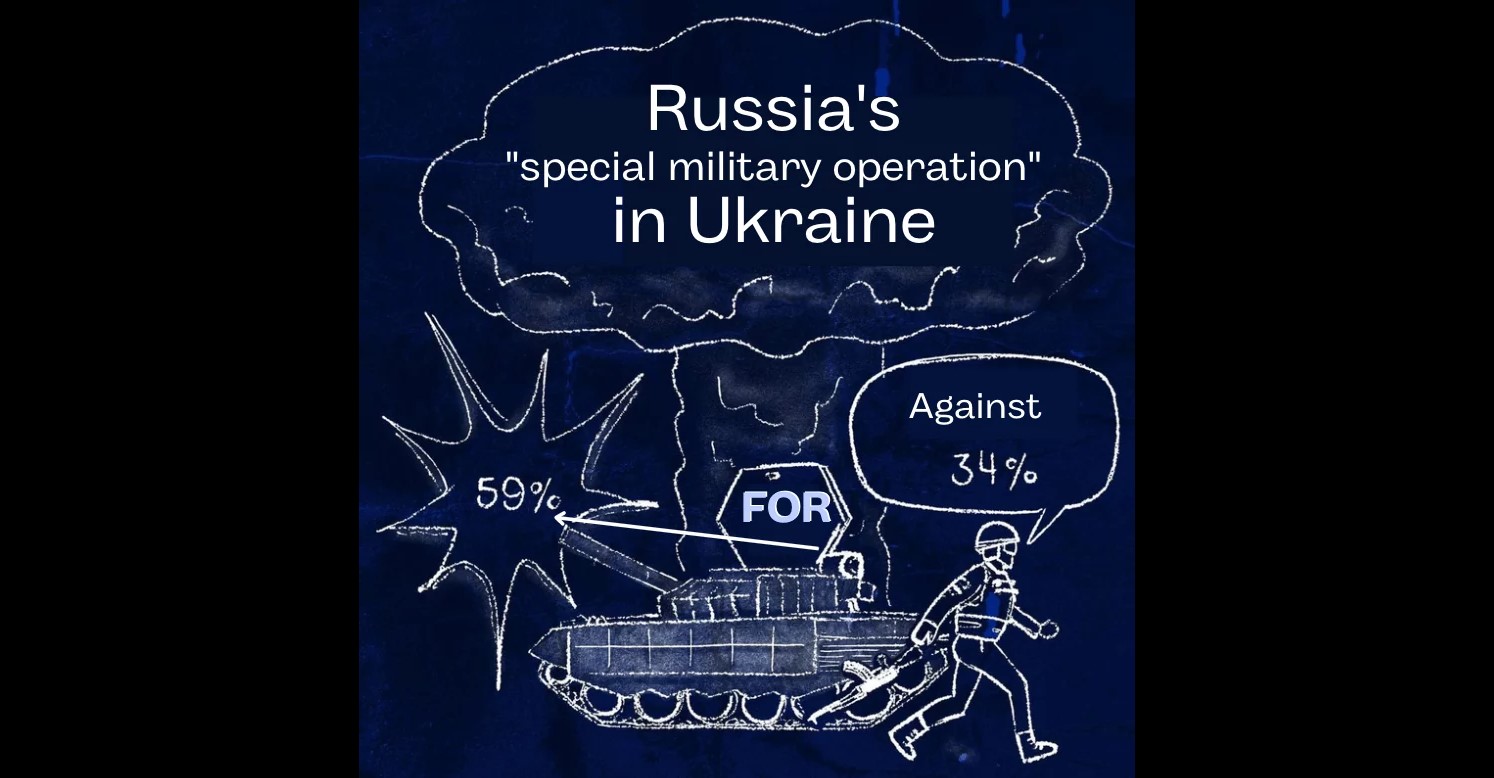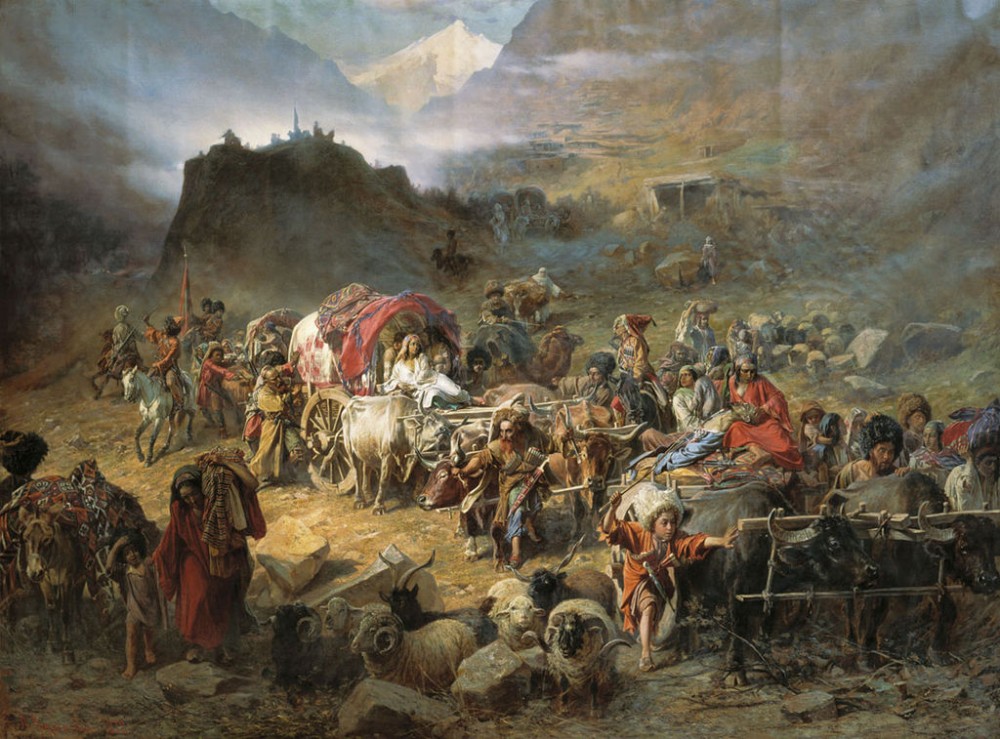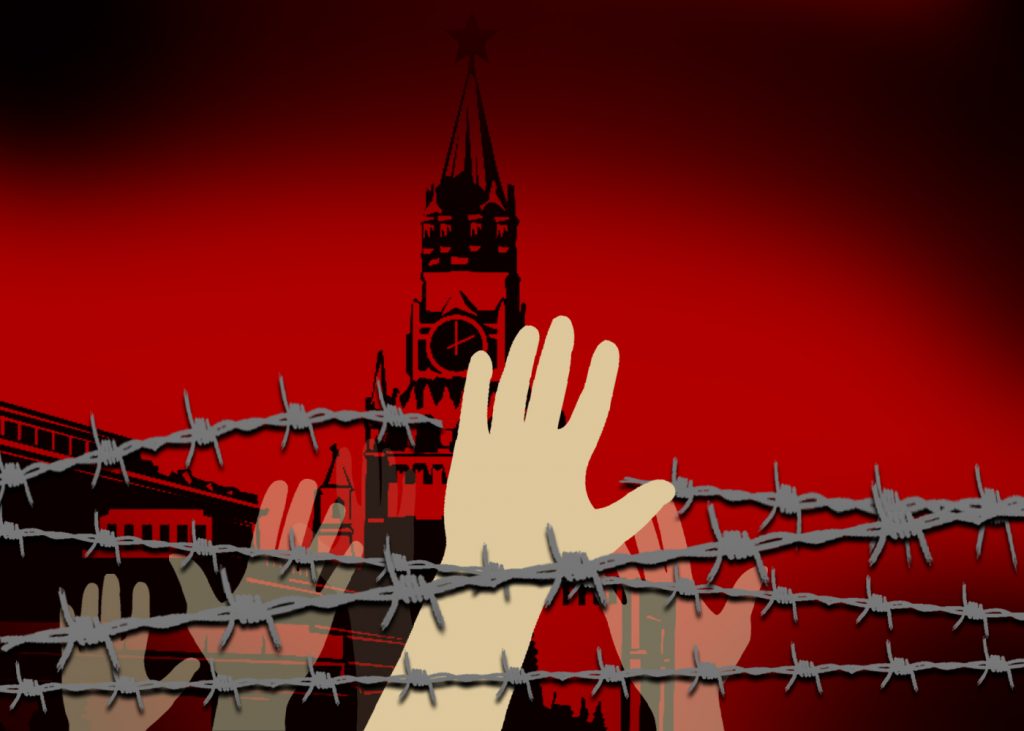The survey, titled "Special military operation in Ukraine: the attitude of the Russians,” was conducted 26-28 February 2022, after Russia’s full-scale aggression against Ukraine had begun.
The survey was conducted by the independent research group Russian Field, together with Russian political activist Maxim Katz. Katz is a former deputy of the municipal assembly of the Moscow region of the opposition party Yabloko (3rd convocation 2012–2016). Katz condemned the war by Russia on his Instagram page the day after the invasion, 25 February. He stated that “the current situation is not that the whole country went crazy. It is important to understand that one individual has gone mad.” His statement does not stand up, however, according to the Russian Field survey conducted 26-28 February. In fact, the results suggest Russians support the war in Ukraine and Putin.
Russians' support for the war

Most survey respondents indicated a positive view regarding Putin’s TV address about the beginning of the "special operation" in Ukraine.
The results show that as of 26-28 February, 58.8% of Russian citizens support Russia's actions in Ukraine, whereas only 34% of Russians do not support the war. The level of support of the war among Russians over 60 reaches higher – more than 70%. However, among younger people (18-29) the positive view drops to about 40%. Half of the respondents aged 18 to 44 gave a negative assessment of “Russia’s actions in Ukraine.”
Attitudes toward Putin and Russia’s foreign policy
After the outbreak of war in Ukraine, almost 50% of Russians’ attitudes towards Putin changed for the better. Only 23% of Russians began to regard Putin for the worse. Significantly, only 25% of Russian citizens believe that the current events have not affected their attitude towards Putin at all.
Attitudes towards Putin correlate with level of education. However, even Russians with higher education began to regard Putin (39.8%), upon the outset of the war, in a better light, and only 28.5% of highly-educated Russians changed their attitude towards Putin for the worse.

In April 2021, on the eve of elections to the State Duma, Russian Field also conducted a survey on the political preferences of Muscovites. 52 6% said they would vote for Putin, while 76.6% said they would not vote for opposition candidate Navalnyy.
63% of Russians felt either “definitely positive” or “rather positive” about the foreign policy of Russia.
What Russians expect from the war
Mostly, Russians are aware of the negative consequences of “the special operation” in Ukraine. As of the first 3–5 days of the invasion, Russians were already expecting higher prices, the introduction of new sanctions against Russia, and an economic crisis.
But Russians also mention possible positive consequences. The three most often named are:
- Growth of Russia's influence in the world
- Recognition of the so-called L/DNR on the world stage
- Expansion of Russia's territory
The Russians also anticipate a number of other consequences, some negative and some positive in their eyes: the risk of a third world war; a complete collapse in all spheres of life of Russian society; the rise of the Russian economy; the improvement of the life of Russians; the unification of Russia and Ukraine; Russia bringing order to the territory of Ukraine; peace in the so-called L/DNR; and even regime change in the Russian Federation. Some of the answers are:
“Due to sanctions, we will improve the situation, raise our economy, Putin’s policy suits me completely, I feel secure.”
“Nothing will change, absolutely nothing will change. At most, the war in the LNR and DNR will stop."
Older respondents more often mention the expansion of Russia's influence in the world. However, negative forecasts also dominate among this group. Young and middle-aged respondents less often mention the positive consequences of the “special operation” in Ukraine.
Regarding the attitudes toward the return of the borders of the USSR, 50% of Russians have a positive attitude about the return. About 30% assess it negatively. The rest have no clear opinion.
Regarding their expected income: 41.8% of Russians believe that it will fall sharply; close to 30% are sure that everything will remain unchanged, and 8% believe that their income may grow in the near future.
The majority of Russians blame the US, one-third blame NATO and Ukraine
Regardless of age, more than half of respondents (59.7%) consider the US the initiator of “the aggravation of the conflict; about a third (30.3%) name NATO; and just under a third (28.9%) say Ukraine.
Russia, as the actual initiator of the conflict, is regarded so by only 16.5%. L/DNR was named only by 3.6%.
Note: The survey allowed for multiple answers to this question.
Less than 3% of Russians consider Putin personally responsible for the "special military operation.” They name other players such as Britain, Europe, the collective West, world-wide government bodies, and simply "everyone." According to some Russian citizens, the event was influenced by outliers like Georgia, Mikhail Gorbachev, and capitalists in general.

Recognition of the so-called L/DNR
Almost 50% of the respondents “definitely positively” assessed the recognition of the so-called L/DNR by Russia; 25% did “rather positively; and only 20% of Russian citizens expressed any negative opinion about the recognition of the so-called L/DNR.
Less than 1% of Russian citizens are unaware of the matter of recognition of the so-called L/DNR.
The majority of respondents (62.8%) are ready to personally support refugees from the so-called L/DNR, humanitarianly and/or financially. One-third of the respondents are against it.
A majority (77.9%) of Russians “rather support” the provision of financial assistance in the amount of 10,000 rubles to refugees from the so-called L/DNR. The issuance of Russian passports to residents of the L/DNR is approved by 73.4%. Less than 1% of Russians do not know about payments to refugees or about the issuance of Russian passports to residents of the so-called L/DNR.
Note: Although the research study was independent and those who carried it out have expressed negative views in social media on the Russian aggression, references to the “L/DNR” are complaisant.
Double-think
The most paradoxical results of the survey arise from a section near the end, titled “Friendship with Ukraine,” [ed. reminiscent of the Soviet era]. While almost 60% of Russians had supported the Russian war, once the “special operation in Ukraine,” (full-scale aggression) began, 88.1% of Russians agreed with the need to maintain friendly relations between Russia and Ukraine. Less than 10% did not consider it necessary. The level of education of respondents did not affect this indicator.
In the survey, researchers state they “do not give estimates, do not express our attitude, but only reflect public opinion on this topic at the end of February 2022.” The survey was conducted by telephone interviews on a random sampling of telephone numbers in different federal districts of the Russian Federation. Monitoring the quality of data collection was carried out using audio recordings of interviews, followed by control of 100% of the selection. The survey publishers state that the margin of error did not exceed 2.5% with a probability of 95%.





